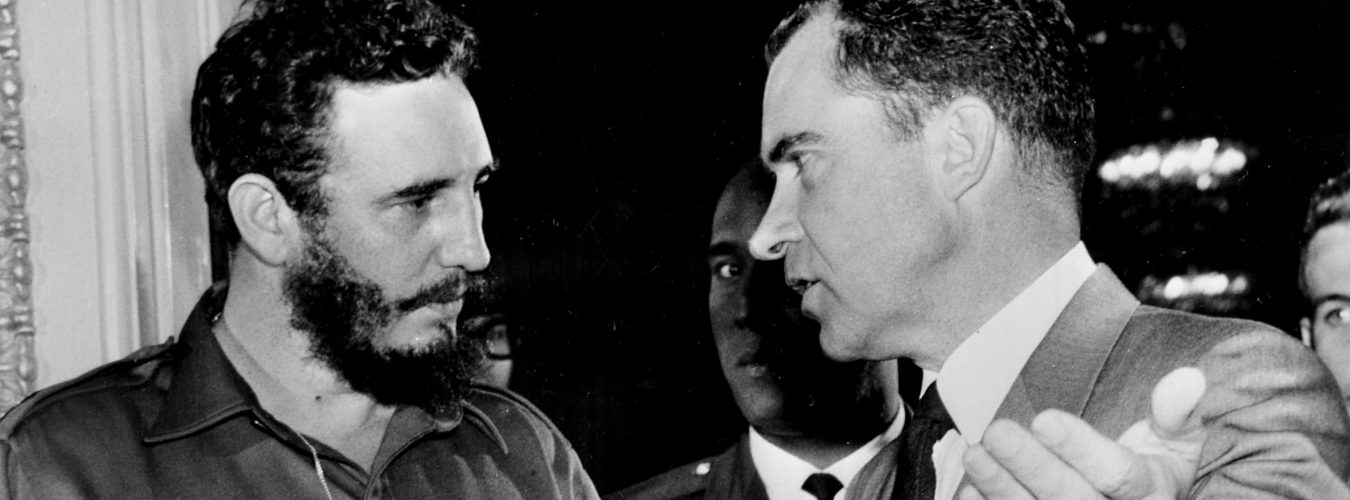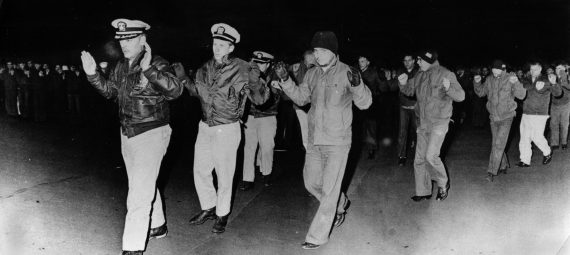
On January 23, 1968, North Korean naval ships attacked and captured the United States spy ship, the USS Pueblo (AGER-2), while it was conducting an intelligence gathering mission in the sea of Japan off of Wonsan, North Korea. The event came to be known as “the Pueblo Incident.” This caused high diplomatic tension between North Korea and the United States. Eventually, the crew was released on December 23, 1968.
From a broader historical context, the initial reaction of the United States government to the Pueblo incident reflected an assumption that a wider communist conspiracy was at the heart of every conflict. Because the Pueblo Incident occurred during the Vietnam War, from the start, most US officials, including the CIA, National Security Adviser Walt Rostow, and the Secretary of Defense Robert McNamara, believed the incident to be a North Korean and Soviet collusion to divert the US efforts from Vietnam. Even after the Kosygin government clarified that there was no Soviet involvement, President Lyndon Johnson still believed the capture of USS Pueblo to be part of a “worldwide challenge to the United States.” Such belief was only strengthened after North Vietnam launched the Tet Offensive in late January, which most US officials reached an unanimous assessment, linking the Tet Offensive with the Pueblo incident. From the perspective of Ambassador William Porter, the goal of the Pueblo incident was to “create a diversion in [the] Korean Peninsula and force us to divert military resources from [our] Vietnam effort and stimulate additional domestic and overseas pressures against US Asian policy.”
With the belief that USS Pueblo being captured was a part of international struggle, in addition to the fact that the US had no diplomatic connection to North Korea, the Johnson administration first turned toward international solutions, including UN interventions and requesting the International Red Cross (IRC) to approach North Korea, yet to no avail. In the meantime, the crisis strengthened the position of American “hawks” like Congressmen Strom Thurmond, who demanded for more forceful military missions against communist countries, and Governor of California Ronald Reagan, who urged that warships be sent into Wonsan harbor and “get the ship back if it isn’t released in twenty-four hours. “As a result, following the capture of USS Pueblo, Johnson called up fifteen thousand reservists and increased the number of American B-52s reinforcing the bomber fleet in the Far East. Yet, North Korea refused to give in. Eventually, the US was forced to accept the North Korean terms to admit that USS Pueblo entered North Korean waters, apologize for this intrusion, and assure that such intrusions will never happen again. This reflects the ineffectiveness of US foreign policy after being caught up in the Vietnam War, as the heavy economic burden resulting from the Vietnam War makes the US almost impossible to afford another local war.
The New York Times reported the event from a liberal, anti-communism standpoint. Its article published on Jan 24, 1968 avoided the use of first person plural pronouns throughout the text, constantly adopting a third person perspective, which increased the article’s objectivity. However, there was still evidence of dualistic thinking in the article. For instance, in the sentence, “The incident forced a sudden confrontation between the United States and an Asian communist government that has long been calling for divisionary assaults against ‘United States imperialism’ to distract American energies from the war in Vietnam,” the author Neil Sheehan was referring to North Korea as an Asian communist government. By specifically highlighting that North Korea was led by a communist government, it hinted that the North Korean government was different from the US government for being a communist government. Combined with the western fear and hatred towards communism during the Cold War, it can be inferred that the term “Asian communist government” had negative implications, and was contrary to the values represented by the US. Also, the sentence argued that North Korea was trying to distract the US from Vietnam, which was similar to the belief of US officials that the Pueblo Incident was to divert US resources from Vietnam and that a unified communist conspiracy was at the heart of every conflict. Similar stance also appeared in another New York Times article published on Jan 29, 1968, in which the author Harry Schwartz argued that it was Kim Il Sung’s envision that “a United States overextended by troubles in different parts of the world, such as Vietnam, Middle East and Latin America, is therefore able to devote only a small fraction of its power to complications in Northeast Asia.”
In addition, although the article offered numerous numbers of primary sources, most of them only feature the perspective of the US, with the exceptions of “the North Vietnamese said at an armistice meeting in Panmunjom that several of the Pueblo’s crew were ‘killed or wounded’ in the incident, and a North Vietnamese broadcast monitored in Tokyo said the vessel resisted seizure.” This demonstrates that the sources used in the article is very one sided towards the US perspective, and has little to no representation of the North Korean perspective.
Works Cited:
Armbruster, William A. “THE PUEBLO CRISIS AND PUBLIC OPINION.” Naval War College Review 23, no. 7 (1971): 84-110. Accessed March 22, 2021. http://www.jstor.org.newman.richmond.edu:2048/stable/44641220.
LERNER, MITCHELL. “A Failure of Perception: Lyndon Johnson, North Korean Ideology, and the “Pueblo” Incident.” Diplomatic History 25, no. 4 (2001): 647-75.
Schwartz, Harry. “The North Korean Strategy Behind the Pueblo Incident” NEW YORK TIMES. Jan 29, 1968, 30.
Sheehan, Neil. “North Korea Seizes Navy Ship, Holds 83 on Board as U.S. Spies” NEW YORK TIMES. Jan 24, 1968, 1.
Welna, David. “Remembering North Korea’s Audacious Capture Of The USS Pueblo.” NPR. NPR, January 23, 2018. https://www.npr.org/2018/01/23/580076540/looking-at-the-saga-of-the-uss-pueblo-50-years-later

